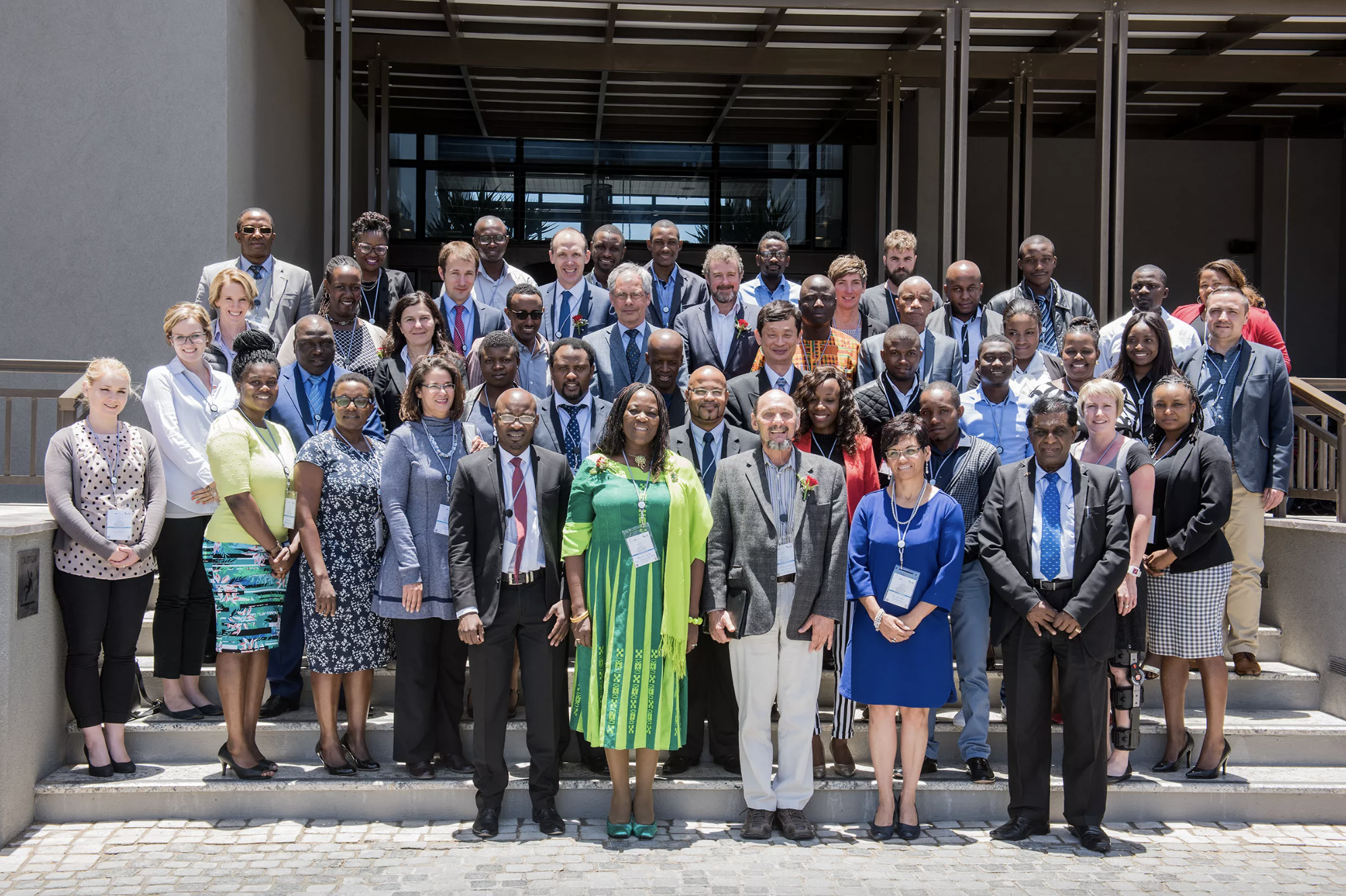
Figure 1: Anicia Peters
Source: Pgallert (2019)
Downloadable teaching resource
Overview
Dr Anicia Peters is a Namibian computer scientist and educator with a focus on Human-Computer Interaction (HCI), gender inclusivity, and fostering innovation through African research excellence.
Background
Born in Rehoboth, Namibia, and raised in Khomasdal among six brothers, Dr Peters attended and adored her first computing class in Germany in 1991 after finishing college. Upon returning to Namibia she trained for a secretarial diploma and worked a variety of places in roles centred on IT before finally taking the jump and training officially in computing, first with a short certification course and then at the Namibia University of Science and Technology (NUST) for a Bachelor of Technology. Attending Iowa State University from 2009 to 2014 she completed her MSc and PhD on Human-Computer Interaction, a topic she continued to study at a Post Doctorate level at Oregon State University (Nghidengwa, 2017).
Contributions
Dr Peters has done a tremendous amount of work advancing interest and encouraging entry into technology and computing throughout Namibia.
In 2015 she became the first Namibian dean at NUST for the Faculty of Computing and Informatics, working to find solutions to issues raised by students or internship providers, while still working as an associate professor in computer science. At NUST she also co-established the Centre of Excellence in IT, before spending time on educational boards with the National Council for Higher Education and the Namibia Qualifications Authority until 2022 (WSA, no date).
She then became the Pro-Vice Chancellor at the University of Namibia, where she co-established the Namibia Green Hydrogen Research Institute and in 2021 appointed by the President of Namibia to be the chair of Namibia’s Task Force on the Fourth Industrial Revolution.
During that time, she also started the Namibia Women in Computing Conference, founded the Africa HCI Conference, and established multiple chapters under the Association for Computing Machinery, as well as serving as an expert for the World Summit Awards for digital innovations and as a digital health consultant for the World Health Organisation (Namesho, 2020).
She currently works as the CEO of National Commission of Research, Science and Technology (NCRST), and the co-chair for the Africa Fourth Industrial Revolution Working Group.

Figure 2: Anicia Peters, in the first full row fourth from the left, and the NCRST Team.
(NCRST, 2021)
Feature: National Commission of Research, Science and Technology (NCRST)
In 2023 Dr Peters joined as the CEO of NCRST, Namibia’s primary organisation dedicated to promoting and encouraging science, technology and innovation. In an interview with Science Councils Granting Initiative (SCGI), Dr Peters discusses the key areas of focus for the NCRST on a national level - including food security, health issues, energy, and drought mitigation, as well as supported research areas - especially in relation to the Fourth Industrial Revolution (4IR) - such as AI in healthcare and green hydrogen power (SCGI, 2025). NCRST itself is one of the first research councils to integrate AI into research management systems, and Dr Peters is aware of the potential of AI investments for Namibia’s development priorities. Considering recent funding cuts to African research councils NCRST are currently developing a paper to assess the implications and develop strategies to continue to support research.
In a statement from the NCRST: “Under the leadership of Prof Anicia Peters, NCRST remains committed to building a coordinated African response to these funding challenges. The goal is to safeguard the sustainability and future growth of research and innovation across the continent.” (NCRST, 2025)
Watch
Listen to Anicia Peters discussing the fourth industrial revolution and how Namibia is approaching this new technological era.
Video 1: Tech expert Prof Anicia Peters breaks down Namibia's journey to 4th Industrial revolution (NBC Digital News, 2022)
Transcript
The industrial revolution has made life easy for everyone and increased production of any kind to improve overall efficiency. It all began in the 18th century, when the first industrial revolution was introduced through the use of steam power and the mechanisation of production. Then the second industrial revolution followed in the 19th century through the discovery of electricity and assembly line production. As curiosity got elevated the third revelation came about in the 20th century through partial automation using memory programmable controls and computers. Today the world is talking about the fourth industrial revolution, the one that is characterised by the application of information and communication technologies to industry. As Namibia hosts the conference on Tuesday, the chairperson of the Namibia 4th task force professor Anicia Peters said the revolution is here and it is inevitable.
Digital technologies it's evolving so fast that something that I might have learned many years ago in my computer science class will not be valid anymore today because it has advanced, so we have to make sure that we constantly keep up with the times and you know what in Namibia some of our youngsters are actually keeping up with that because they are enrolling in online classes they are learning about AI, etc. But sometimes the older generation we are not um you know we we are not keeping up to date with the latest now, but we need to have specialists you know who can design and develop the technologies because Namibia is a consumer country. We still consume too much you know we want to go on and we want to use all of these apps but we don't want to create our own.
The challenge that one has to address in taking everyone along is a lack of access to electricity and internet particularly in remote areas. There is also fear of job losses to the 4ir but in general lawyers could be replaced. Then you have for instance accountants, then you have for instance those type of there was recently a report by Unesco on AI in education and what they said is that the middle layer jobs you know are the jobs that are easily to be replaced, something that you can program you know on a computer and the computer can a repetitive task and a computer can do it as well as just use some of the data that it has from before to sort of make sense of what it is so um so um I mean way into the future a teacher could be replaced right because we can learn online we can have an online tutor in fact I worked on such a tutoring system.
References and further reading
Humans of Globe (2024) Professor Dr. Anicia Peters: Steering Namibia Toward a Future of Technological Superiority. Available at: https://humansofglobe.com/professor-dr-anicia-peters-steering-namibia-toward-a-future-of-technological-superiority/ (Accessed: 26 July 2025)
Makwele, P. (2025) “Nice Girls Do Not Get the Corner Office in Tech”(….A Computer Scientist’s Story). Available at: https://www.confidentenamibia.com/nice-girls-do-not-get-corner-office-techa-computer-scientists-story (Accessed: 26 July 2025)
Namesho, S. (2020) Behold, Anicia Peters begins her reign. Available at: https://forumonline.unam.edu.na/behold-anicia-peters-begins-her-reign/ (Accessed: 26 July 2025)
NCRST (2025) NCRST tasked to assess the Impact of International Research Funding Cuts on African Research Funders. Available at: https://www.linkedin.com/posts/national-commission-on-research-science-and-technology_ncrst-grc2025-researchfunding-activity-7353766150347849732-es3E/ (Accessed: 29 July 2025)
NBC Digital News (2022) Tech expert Prof Anicia Peters breaks down Namibia's journey to 4th Industrial revolution- nbc. Available at: https://www.youtube.com/watch?v=RBN2B8H35UM&ab_channel=NBCDigitalNews (Accessed: 5 September 2025)
NCRST (2021) Group photo of the NCRST research team. Available at: https://www.ncrst.na/about-ncrst/ (Accessed: 5 September 2025)
Nghidengwa, M. (2017) Peters inspires love of computing. Available at: https://web.archive.org/web/20170906161153/http:/www.confidente.com.na/2017/06/peters-inspires-love-of-computing/ (Accessed: 20 July 2025)
Pgallert (2019) File: Anicia Peters in 2018.jpg. Available at: https://commons.wikimedia.org/wiki/File:Anicia_Peters_in_2018.jpg (Accessed: 20 July 2025)
SGCI (no date) National Commission on Research Science and Technology (Namibia). Available at: https://sgciafrica.org/council/national-commission-on-research-science-and-technology-namibia/#:~:text=The%20National%20Commission%20on%20Research,innovative%20thinking%20across%20all%20disciplines (Accessed: 29 July 2025)
SGCI (2025) What it takes to build adaptive and resilient Councils: A Conversation with Anicia Peters, Namibia. Available at: https://www.youtube.com/watch?v=PRui4eheSc4&ab_channel=SGCI (Accessed: 29 July 2025)
WSA (no date) Prof. Anicia Peters. Available at: https://wsa-global.org/person/anicia-peters/ (Accessed: 27 July 2025)
